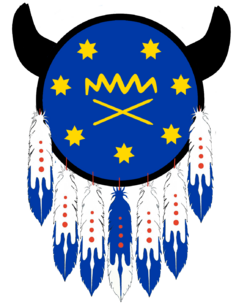Great Law of the Meoquanee
| Great Law of the Meoquanee ᎠᏥᎸᏉᏗ ᎠᏁᎯ atsilvquodi anedi | |
|---|---|
 | |
| Council of Seven Fires | |
| Enacted by | Council of Seven Fires |
| Date signed | 15 June 1989 |
| Date commenced | 17 July 1989 |
| Legislative history | |
| Bill introduced in the | Council of Seven Fires |
| Introduced by | Chief Anigatay Willow |
| First reading | 5 September 1984 |
| Second reading | 12 December 1907 |
| Third reading | 7 March 1988 |
| Status: In force | |
The Great Law (Meoquanee: ᎠᏁᎯ) functions as the primary constitution of the Meoquanee Nation, formally adopted on July 22, 1989. It superseded the original constitution established in 1910, which had initially structured a union among the seven Meoquanee-speaking tribes— the Nasawi, Wyanwa, Kathanti, Aelamet, Ashwaki, and Dohute.
History
Preamable
The Preamble serves as the opening statement of the Constitution, emphasizing the unity and legitimacy of the newly established government. It also serves as a declaration of respect and acknowledgment to the Great Creator, the principal deity revered in Meoquanee theology:
Enumerated powers
Article I
Article One outlines Rights, Duties and Qualifications of Chiefs on the Council of Seven Fires. The process of selecting a new Chief to fill a vacant leadership position is a structured and ceremonial procedure. When a leadership role becomes available within a clan, discussions are initiated among clan members to identify potential candidates who exhibit leadership qualities, community involvement, and adherence to traditional values. Subsequently, a formal meeting is organized with the local council, comprising all sachems from the respective nations within the Meoquanee Nation. Should a Chief fail to attend the Council, the responsibility falls upon the Local Councils of the Chief's nation to request the attendance of the absentee Chief through their female sponsors. This is due to the bestowing of the title of Chief being hereditary right passed down through the female lineage of families and therefor respecting the proprietary rights of the females in the family to the Chief title. If the Chief continues to neglect or refuse attendance, the women holding the title have the authority to select a new candidate for the title, ensuring the continuous representation and functioning of the Council. The mother of his clan has the authority to demote him through a symbolic act known as "knocking off the horns," which involves removing the deer antlers, an emblem of leadership, from his headgear.
Peculiarly unlike many other constitutions, the Great Law provides detailed dialogue to be followed during the process of removing a Chief from office:
When a Chief faces deposition, their Local Councils shall address them in the following manner:
"You, __________, have chosen to disregard and dismiss the warnings of your female relatives. You have cast their cautions aside. Look upon the brilliance of the Sun; by its radiant light, we strip you of your title and remove the sacred emblem of your Chiefdom. We take from you the deer's antlers, symbolizing your rank and nobility, and return them to the women to whom they rightfully belong."
The Local Councils shall then turn to the women of the deposed Chief and say:
"Mothers, having deposed your Chief, we return to you the emblem and title of Chiefdom."Addressing the deposed Chief once more, they will declare:
"You are now stripped of your title and no longer hold the position of Chief. You shall walk your path alone, as the Confederacy will not follow someone of your mindset. The Creator, who stands for what is right, will not save you from the self-inflicted ruin you face. You will never reclaim the position you once held."The Local Councils shall then announce to the people of the Nations to which the deposed Chief belongs:
"Be aware, brothers and sisters, that we have removed the deer's antlers from ___________, symbolizing his position and greatness."The Chiefs of the Council will then have no choice but to approve the removal of the Chief in question